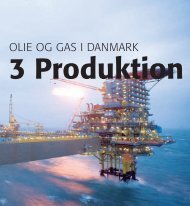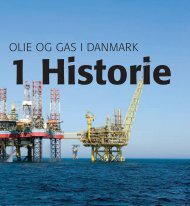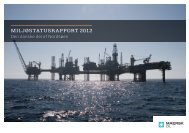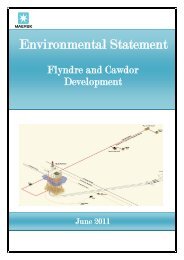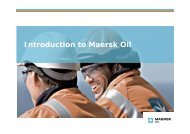Environmental Statement - Maersk Oil
Environmental Statement - Maersk Oil
Environmental Statement - Maersk Oil
You also want an ePaper? Increase the reach of your titles
YUMPU automatically turns print PDFs into web optimized ePapers that Google loves.
Balloch Field Development <strong>Environmental</strong> <strong>Statement</strong><br />
Appendix A – Review of Legislation<br />
emergency planning<br />
(shipping)<br />
(Implementation of Ship‐Source<br />
Pollution Directive) Regulations 2009<br />
The Merchant Shipping (<strong>Oil</strong> Pollution<br />
Preparedness, Response and Co‐<br />
operation) Regulations 1998 (as<br />
amended 2001)<br />
source polluting discharges constitute in principle a criminal offence. According to the Directive this relates to discharges<br />
of oil or other noxious substances from vessels. Minor discharges shall not automatically be considered as offences,<br />
except where their repetition leads to a deterioration in the quality of the water, including in the case of repeated<br />
discharges<br />
The Directive applies to all vessels, polluting discharges are forbidden in:<br />
Internal waters, including ports, of the EU<br />
Territorial waters of an EU country<br />
Straits used for international navigation subject to the regime of transit passage, as laid down in the 1982<br />
United Nations Convention on the Law of the Sea (UNCLOS)<br />
The exclusive economic zone (EZZ) of an EU country<br />
The high seas<br />
The Merchant Shipping (Implementation of Ship‐Source Pollution Directive) Regulations 2009 implement EU Directive<br />
2005/35/EEC by making amendments to the following:<br />
The Merchant Shipping Act 1995<br />
The Merchant Shipping (Prevention of <strong>Oil</strong> Pollution) Regulations 1996<br />
The Merchant Shipping (Dangerous or Noxious Liquid Substances in Bulk) Regulations 1996 (as amended 2004)<br />
The Regulations limit the defences available to the master or owner of a ship involved in an oil spill or chemical spill and<br />
extend liability for the discharge to others such as charterers and classification societies. This closed a loop hole in the<br />
existing legislation where some large spills were not open to prosecution under MARPOL.<br />
Regulator: DECC<br />
Requires the Operator to produce a site specific <strong>Oil</strong> Pollution Emergency Plan (OPEP) to be submitted to DECC and<br />
statutory consultees at least 2 months prior to start of activities. An OPEP needs to cover the procedures and reporting<br />
requirements on how to deal with an incident where hydrocarbons are being released into the sea.<br />
All approved OPEPs must be reviewed and resubmitted to DECC and consultees no later than five years after initial<br />
submission. In order to ensure adequate cover the operator must submit the plan at least 2 months prior to the end of<br />
this deadline.<br />
Regular reviews are further required to ensure response capabilities, operation details and contact details remain<br />
current.<br />
Vessels that are in transit will be covered under the SOPEP however when once on site and carrying out work for the<br />
operator the vessels should be covered by the operators OPEP.<br />
A ‐ 33




